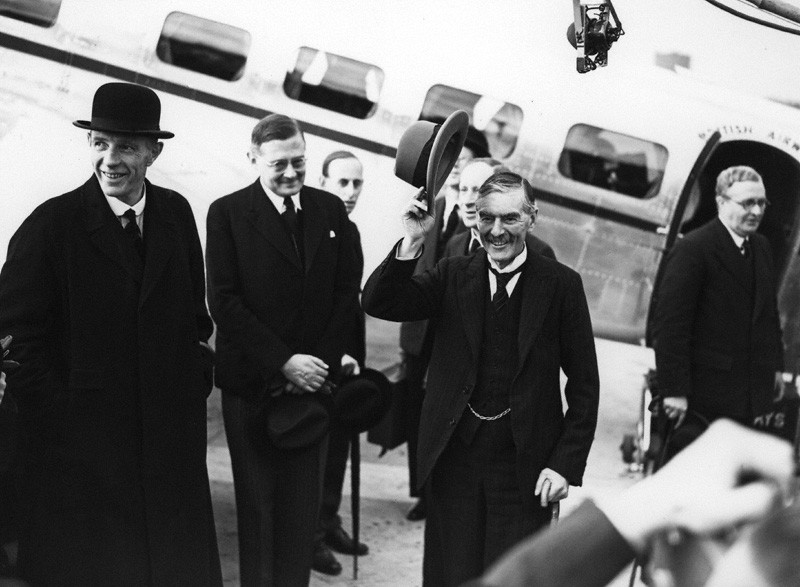The Failure of Appeasement April 2, 2015
Author: Beach Combing | in : Contemporary , trackbackAppeasement is the policy of giving smiles, kisses and gifts to neighbours to prevent war. In some moments of history it has worked (Dane-geld and Roman bribery beyond the frontiers); in some periods it has failed. A conspicuous example of a failure is the attempt by Britain to stroke its European friends and enemies into quiescence in the late 1930s. For many readers this will be incredibly, painfully obvious, but others may have their doubts for there is a thesis that has grown more and more powerful with the years that Britain was wrong to fight in World War 2, that as well as mortgaging the nation, and permitting a Soviet victory on the Continent, Britain destroyed the Empire and allowed almost half a million British and Dominion troops and citizens to die. British Prime Minister Neville Chamberlain was right, then, these partisans of appeasement shout, Britain should never have resorted to arms against an enemy that had no interest in British territory. The best published example of this argument (known to this author), is John Charmley’s Chamberlain and the Lost Peace (also well worth reading is Charmley’s bio of Churchill), Charmley is in delicious form in this televised debate, meanwhile, and for anyone wanting to read a contemporary perspective Chips Channons’ diaries are wonderful and sum up conservatism with: ‘today we made history or what is more important stopped it.’ (unverified from memory)
The argument that Britain should or should not have fought is a complex one and will not be touched upon here: there are strong points on both sides. Instead, Beach wants to make a far more limited but, hopefully, more powerful point, namely that appeasement failed, not just in absolute terms, but also in its own terms. Broadly speaking there were three positions that Britain could have taken up in the late 1930s. The first position was an aggressive foreign policy that would have intimidated and if necessary attacked the totalitarian states wherever they lifted their goafer-like heads; the second position was appeasement, which meant, as noted above, caressing the totalitarian states into the land of nod; the third position was isolationism, which meant leaving the totalitarian states and continental Europe alone, as long as they left Britain and the Empire to their own devices (a parallel for what America did in those years). Churchill (and his latter day supporters) are clearly the best representatives of the first tendency: what is more interesting are the second and third. Chamberlain and Halifax were appeasers. Yet the supporters of appeasement today are actually retrospectively supporting isolationism, something that Chamberlain and Halifax refused to countenance.
And this brings us to the essence of appeasement. As noted above appeasement failed on its own terms: it was Chamberlain who in the end declared war on Nazi Germany. He was obliged to do so because he and his coterie had misunderstood the nature of Nazi Germany and Fascist Italy. They thought that the mad dogs could be lulled to sleep, when their singing just riled the dogs up further. Were Germany and Italy to become aggressive on the Continent or the Mediterranean or at least overly aggressive, then the appeasers believed that war was the only answer to Hitler. Charmley and co have argued instead that war should only have been resorted to should Hitler have actually attacked Britain or British possessions. Again isolationism and Churchillian aggression both have a great deal to recommend them. Chamberlain’s appeasement does not, for the simple and demonstrable reason that appeasement was supposed to have stopped aggression and did not; in fact, it encouraged aggression. Take the events of Munich seen through the eyes of the three positions above: Churchill would have declared war; an isolationist would have said ‘nothing to do with us, guv’. (Two sensible positions.) Chamberlain, instead, sought a middle way and tried to quieten the crazies earning only undying disdain from Hitler and Mussolini, the former of which memorably said of Munich ‘the old man gave me a piece of paper and asked me to sign it.’
Appeasement gave Britain the worst of both world (Wars): an inevitable conflict without the resources to fight it. Other views: drbeachcombing AT yahoo DOT com Charmley and his friends have the wrong hero.
30 April 2015: ANL writes ‘Slightly beside the point, but what if Britain had adopted isolationism in the First World War (which would in that case have been a relatively local affair)? The Germans would have beaten France quite easily and occupied it for a while, without any major atrocities, but there would have been no Hitler and (very probably) no Second World War. One of the main “hawks” who promoted Britain’s disastrous entry into the First World War was the First Lord of the Admiralty, Winston Churchill; so it could well be argued that Churchill created Hitler in the first place.’ Thanks, ANL!



